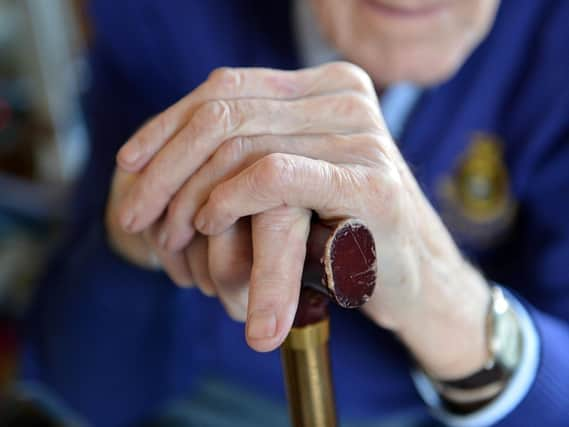Adult social care should be about human dignity not corporate profit – Richard Leonard


In it, Scotland’s care system is dissected, its fundamental weaknesses exposed, and constructive and credible alternatives set out.
It came out last May just as the pandemic was ripping through Scotland’s care homes and helped me spearhead the case for both a human-rights based public inquiry into the handling of the pandemic in residential care, but also for the creation of a National Care Service. This in turn forced the SNP Government to establish a review group to consider this proposition among others which resulted in the publication last week of the Feeley report.
Advertisement
Hide AdAdvertisement
Hide AdThe report has some merit. In his foreword Derek Feeley writes
“We have inherited a system that gets unwarranted local variation, crisis intervention, a focus on inputs, a reliance on the market, and an undervalued workforce. If we want a different set of results, we need a different system.”
It is a good start.
And the report goes on to talk about human rights, equity and equality. The need for co-production by service users in the design and delivery of care. The case for implementing, at last, the central Christie Commission recommendation and instituting a decisive shift towards prevention.
On funding the review estimates that cuts to services of up to 20 per cent have been the consequence of a decade of austerity. That spending on social care represents an investment in the Scottish economy. And that the principle of social care free at the point of need should be adopted right across Scotland.
On the terms and conditions of employment of a workforce which is 83 per cent female the report concludes “Were it 83 per cent male, it simply would not be marginalised and undervalued as it is.”
The principal recommendation of the review is the establishment of a National Care Service. But that is where it starts to run out of ambition.
The report claims to tackle head on the question of ownership in its vision of a National Care Service. It even has a whole section headed “why not nationalisation?” But in so doing it poses the wrong question, in the wrong way and drowns in a sea of its own contradictions.
By citing the purchase price of £900,000 paid for the Home Farm care home in Skye which NHS Highland was forced to take over last year as an illustration of the prohibitive cost of public ownership, it picks the wrong example.
Advertisement
Hide AdAdvertisement
Hide AdThe Home Farm care home experience doesn’t make the case for continued private ownership, but rather the case against it.
Besides there was no need to give the full market value as compensation to HC-One shareholders, not least because in light of events in the home there was a legitimate public interest in taking it in to public ownership.
It disregards the precarious economics of the so called “care industry”. Don’t forget Southern Cross Healthcare the UK’s largest care home operator and the previous owners of Home Farm went bust in 2011.
And even chooses to ignore its own finding (46 pages later) that 84 per cent of the current annual funding of £3.8 billion for social care in Scotland comes directly from the public purse through the public sector. We pay for it, why shouldn’t we own it?
In fact despite itself, the Feeley Review is recommending “nationalisation” but with private, not public ownership as the engine. By eschewing one ideology it is guilty of aligning itself with another.
It goes much further suggesting that local authorities should no longer be accountable at all for adult social care but be reduced to competing as just another provider in a procurement exercise run by reformed but unelected Integrated Joint Boards. And remember this isn’t just about who operates residential care homes but who provides home care services in the community.
There is also a recommendation that a rather junior sounding Minister should be put in charge of social care instead of locally, directly elected and accountable political representatives.
This would be a step backwards not forwards.
The review does consider the profit motive and calls for a “new deal” in the commissioning and procurement process including greater financial transparency and stipulations on the level of financial return to be reinvested in the service and the chronically undervalued hard-working staff.
Advertisement
Hide AdAdvertisement
Hide AdBut despite concluding that the “for profit” model means “significant sums leave the care economy” it has nothing to say on the ethics of some of the biggest providers being run by companies whose ultimate ownership is in offshore tax havens from the Channel to the Cayman Islands. Nor in contrast how public ownership would keep all funding in the local economy and reinvested in the care service and its workforce.
Adult social care should be about human dignity not corporate profit, tax avoidance and shareholder dividends.
Very few people view the creation of a National Care Service as an exercise in the mass nationalisation of the entire care sector in one big bang.
But there has got to be a better path forward which is based on locally democratically accountable services provided directly by the public sector, which sees a continuing role for not for profit providers, and which understands the need for a strategic investment in care by the state to shape the kind of society that we want to live in.
Commenting on the Feeley Review Nick Kempe said
“If implemented the recommendations will result in further centralised control and top-down management solutions being imposed on staff who need the opposite – time to care.”
When it comes to social care in Scotland we cannot continue as we are. If ever there was a case for public services run for people not profit, for public interest before private markets, for revolution not reform this is it. If ever there was a time to act it is now.